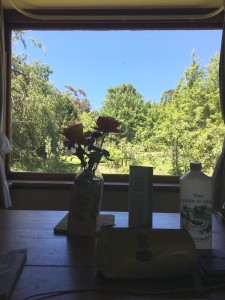Some of you will remember the story, View from a hospital bed window.
While writing the poem about looking out my window
this story came back to my mind. I am surprised how it speaks to us
today in our time of self-isolation –
and how important it is for us to carry hope in the pocket of our heart
when looking out the window on our world.

Here again is that story I have adapted to verse.
.View from a hospital bed window. (Anon)
Two men, both seriously ill,
occupied the same hospital room.
One man could sit up in his bed
which was next to the room’s only window.
The other man had to spend all his time
flat on his back.
The men talked for hours on end.
They spoke of their wives and families,
their homes, their jobs.
Every afternoon,
when the man in the bed by the window
would sit up, he’d describe to his roommate
what he could see outside the window.
The man in the other bed began to live for those times
when his world would be broadened, enlivened
by all the activity and colour of the world outside.

The window overlooked a park with a lovely lake
Ducks and swans played on the water.
Children sailed their model boats.
Young lovers walked arm in arm
amidst flowers of every colour
A fine view of the city skyline could be seen in the distance.
As the man by the window described all this exquisite detail,
the man on the other side of the room
would close his eyes
and imagine this picturesque scene.
One warm afternoon, the man by the window
described a parade passing by.

Although the other man could not hear the band
he could see it in his mind’s eye as the man described it.
Days, weeks and months passed.
One morning, the day nurse arrived
to find the lifeless body of the man by the window.
He had died peacefully in his sleep.
She was saddened, called the hospital attendants to take the body away.
As soon as it seemed appropriate,
the other man asked if he could be moved
next to the window.
The nurse was happy to make the switch,
and after making sure he was comfortable,
she left him alone.
Slowly, painfully, he propped himself up on one elbow
to take his first look at the real world outside.
He strained to slowly turn to look.
He faced a blank wall.
The man asked the nurse
what could have compelled his deceased roommate
who had described such wonderful things outside this window.
The nurse responded that the man was blind.
He could not even see the wall.
She said, “Perhaps he just wanted to encourage you.”

Another voice that speaks for us today is Cavafy. In his famous life journey poem Ithaka (see below) he says,
we only encounter what we bring along inside our soul.
We only see see what our soul sets up in front of us.

Ithaka
by C.P. Cavafy
trans. Edmund Keeley
As you set out for Ithaka
hope your road is a long one,
full of adventure, full of discovery.
Laistrygonians, Cyclops,
angry Poseidon—don’t be afraid of them:
you’ll never find things like that on your way
as long as you keep your thoughts raised high,
as long as a rare excitement
stirs your spirit and your body.
Laistrygonians, Cyclops,
wild Poseidon—you won’t encounter them
unless you bring them along inside your soul,
unless your soul sets them up in front of you.
Hope your road is a long one.
May there be many summer mornings when,
with what pleasure, what joy,
you enter harbours you’re seeing for the first time;
may you stop at Phoenician trading stations
to buy fine things,
mother of pearl and coral, amber and ebony,
sensual perfume of every kind—
as many sensual perfumes as you can;
and may you visit many Egyptian cities
to learn and go on learning from their scholars.
Keep Ithaka always in your mind.
Arriving there is what you’re destined for.
But don’t hurry the journey at all.
Better if it lasts for years,
so you’re old by the time you reach the island,
wealthy with all you’ve gained on the way,
not expecting Ithaka to make you rich.
Ithaka gave you the marvellous journey.
Without her you wouldn’t have set out.
She has nothing left to give you now.
And if you find her poor, Ithaka won’t have fooled you.
Wise as you will have become, so full of experience,
you’ll have understood by then what these Ithaka mean.
In her poem Son of Mine Oodgeroo Noonuccal (see below)
says in all the pain and suffering she carried she wanted to tell only of the good , the brave and the fine.Words have the power to plants seed in souls over and over to grow the good, the brave and the fine.

Son of Mine by Oodgeroo Noonuccal
My son, your troubled eyes search mine,
Puzzled and hurt by colour line.
Your black skin as soft as velvet shine;
What can I tell you, son of mine?
I could tell you of heartbreak, hatred blind,
I could tell you of crimes that shame mankind,
Of brutal wrong and deeds malign,
Of rape and murder, son of mine;
But I’ll tell you instead of brave and fine
When lives of black and white entwine,
And men in brotherhood combine-
This would I tell you, son of mine.
